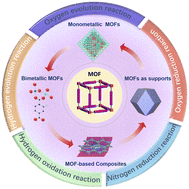
论文题目:Recent progress in metal–organic frameworks (MOFs) for electrocatalysis
论文作者:Cha Li, Hao Zhang, Ming Liu, Fei-Fan Lang, Jiandong Pang*and Xian-He Bu*
发表期刊:Industrial Chemistry & Materials 2023,1, 9-38

Abstract:
Electrocatalytic technology opens a new path to solve the existing problems in fossil fuel consumption and environmental pollution as well as efficient energy use. Metal–organic frameworks (MOFs), a class of crystalline porous materials with high specific surface area, high porosity and customizable structures, have emerged as promising electrocatalysts. However, their inherently low electrical conductivity and stability greatly hinder their further applications. Therefore, strategies such as synthesizing two-dimensional conductive MOFs, designing unsaturated metal sites, and building MOF nanoarrays have been developed to enhance the conductivity and catalytic reaction transfer rates of MOFs, accompanied by the rational designs of MOFs for improving their stability. In this review, the applications of MOF-based electrocatalysts in the hydrogen evolution reaction (HER), hydrogen oxidation reaction (HOR), oxygen evolution reaction (OER), oxygen reduction reaction (ORR) and nitrogen reduction reaction (NRR) are presented in detail with the classification of monometallic MOFs, bimetallic MOFs, MOF-based composites and MOFs as supports. In addition, the relationship between the structure and performance is discussed through DFT calculations used in related work. Finally, future challenges and application prospects of MOFs in electrocatalysis are highlighted.
